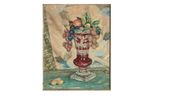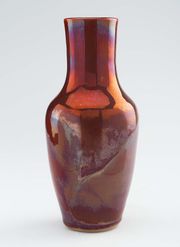Difference between revisions of "Copper ruby glass"
Jump to navigation
Jump to search
| (3 intermediate revisions by 2 users not shown) | |||
| Line 1: | Line 1: | ||
| + | [[File:Bohemian glass vase.jpg|thumb|Painting of Bohemian vase<br>MFA# 41.255]] | ||
| + | [[File:Oxbloodvase8740.jpg|thumb|Oxblood gaze vase<br>MFA# 87.40]] | ||
== Description == | == Description == | ||
| Line 7: | Line 9: | ||
vidro rubi de cobre (Port.); Bohemian glass; Bohemian ruby glass | vidro rubi de cobre (Port.); Bohemian glass; Bohemian ruby glass | ||
| − | == | + | == Resources and Citations == |
* G.S.Brady, ''Materials Handbook'', McGraw-Hill Book Co., New York, 1971 Comment: p. 365 | * G.S.Brady, ''Materials Handbook'', McGraw-Hill Book Co., New York, 1971 Comment: p. 365 | ||
| − | * ''Encyclopedia Britannica'', http://www.britannica.com Comment: "ruby glass." | + | * ''Encyclopedia Britannica'', http://www.britannica.com Comment: "ruby glass." Accessed: 12 Sept. 2002 . |
* Thomas B. Brill, ''Light Its Interaction with Art and Antiquities'', Plenum Press, New York City, 1980 | * Thomas B. Brill, ''Light Its Interaction with Art and Antiquities'', Plenum Press, New York City, 1980 | ||
Latest revision as of 14:17, 4 July 2022
Description
A deep red glass that was first produced by glass manufacturers in Bohemia in the 19th century. The deep red color is produce by microscopic size Copper and/or copper oxide particles dispersed the melt. Copper ruby glass may also contain salts of Selenium, Cadmium, and Arsenic. The Bohemian ruby glass was often cast in thin layers over clear glass, then carved for a two-tone decorative effect. In the 20th century, copper ruby glass was used for automobile taillights.
Synonyms and Related Terms
vidro rubi de cobre (Port.); Bohemian glass; Bohemian ruby glass
Resources and Citations
- G.S.Brady, Materials Handbook, McGraw-Hill Book Co., New York, 1971 Comment: p. 365
- Encyclopedia Britannica, http://www.britannica.com Comment: "ruby glass." Accessed: 12 Sept. 2002 .
- Thomas B. Brill, Light Its Interaction with Art and Antiquities, Plenum Press, New York City, 1980

